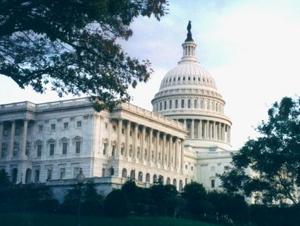Obama’s nominee to D.C. appeals court has implications for environmental policy
President Barack Obama’s pledge to use his executive powers to combat global warming begins another fateful turn on Capitol Hill this week.
On Wednesday, the Senate Judiciary Committee began hearings on Sri Srinivasin, the president’s latest nominee for the nation’s second-most prestigious court — the D.C. Court of Appeals. His hearing was uneventful, with signs indicating he may actually win approval — something that’s proven elusive for years.
Since 2006, partisan politics have gridlocked appointments to the Republican-dominated court, which frequently presides over legal challenges to presidential orders and agencies like the EPA. In March, Republicans filibustered the nomination of New York lawyer Caitlin Halligan for the second time, forcing her to withdraw.
The court currently has seven members, three appointed by Democrats and four by Republicans, as well as four vacancies — plus six senior judges, who have essentially reached retirement, but continue to hear a reduced case load. Of those six, five were appointed by Republicans and just one by Democrats.
Tom McGarity, a law professor at the University of Texas, said the D.C. court is especially influential on matters of the environment, because of laws that proscribe many actions taken by the EPA as only being reviewable at the D.C. court. He says many environmental groups believe Republicans are deliberately slowing down nominations to the court, in order to preserve its conservative nature.
“It’s up to the president to appoint judges to fill these positions, but they can only be filled with the advice and consent of the Senate,” McGarity added. “There can, of course, be legitimate reasons for opposing a nominee. But it was hard to see, to me at least, any legitimate reasons for opposing Caitlin Halligan.”
The vacancies on the court have led to a dramatic increase in the caseload for individual judges.
“And the cases coming out of the D.C. circuit are slower and slower,” McGarity said.
The court is currently considering a case relating to an E.P.A. rule regulating mercury emissions from power plants. The E.P.A. is also considering a rule to regulate power plant greenhouse gas emissions, which McGarity expects will wind up in front of the D.C. circuit, once it’s finally issued.
And McGarity said the D.C. court could play a role in reviewing the controversial Keystone XL pipeline as well.
“Should President Obama decided to approve the permit for the pipeline, it’ll be challenged by environmental groups, and my guess is the challenge would not be in the D.C. circuit,” he said. “But it could be challenged by industry groups if it went the other way, and they would have their choice, but my guess is they would go to the D.C. circuit.”
All this means Obama’s nominees to the D.C. circuit will play a major role in shaping the country’s environmental policy, far into the future.
“The delivery of justice in this country is an important thing, and if we don’t have enough judges, we’re not going to get justice, or we’re not going to get good justice,” McGarity said.
The World is an independent newsroom. We’re not funded by billionaires; instead, we rely on readers and listeners like you. As a listener, you’re a crucial part of our team and our global community. Your support is vital to running our nonprofit newsroom, and we can’t do this work without you. Will you support The World with a gift today? Donations made between now and Dec. 31 will be matched 1:1. Thanks for investing in our work!
